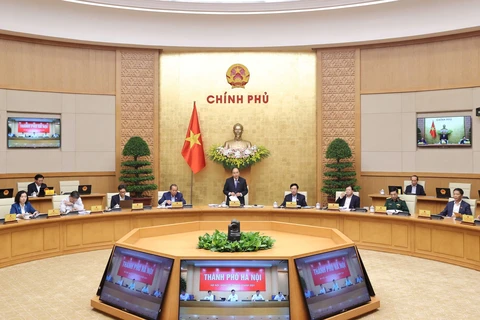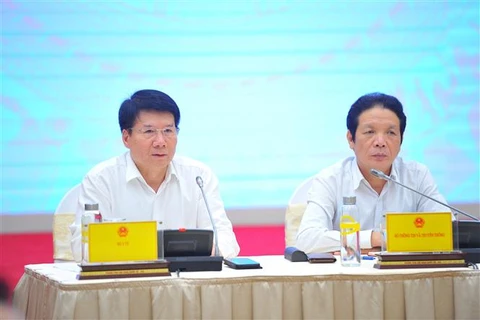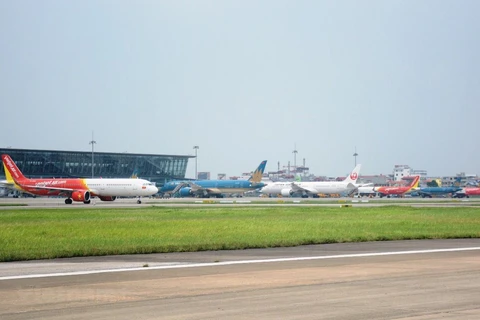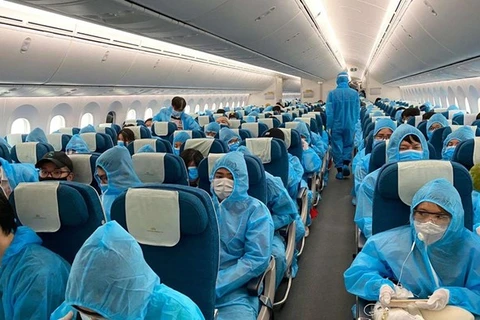Hanoi (VNA) – The Civil Aviation Authority of Vietnam (CAAV) has proposed the Ministry of Transport apply the “vaccine passport” policy to people planning to enter the country.
It suggested that those who have COVID-19 vaccination certificates, also referred to as “vaccine passports”, and a negative PCR test result for the disease be permitted to enter Vietnam and undergo a shortest possible duration of concentrated quarantine.
The CAAV held that resuming regular international flights is urgent, but Vietnam has yet to have legal rules related to the “vaccine passport” implementation as well as relevant agreements at the Governmental or ministry levels between Vietnam and other countries.
The “vaccine passport” in combination with PCR testing is an effective solution to resume regular international flights, the authority noted, adding that it is necessary for countries to have mutual recognition and connect their systems to apply the “vaccine passport” policy.
However, the CAAV said, COVID-19 vaccines do not guarantee absolute or immediate protection from the disease as those already getting inoculated may still contract the coronavirus. It is a need to further study the effectiveness and duration of protection of each type of vaccine.
At the Government’s regular press meeting on March 31, Deputy Minister of Health Truong Quoc Cuong said the “vaccine passport” is still under consideration and also controversial in many countries.
In Vietnam, the Ministry of Health is working with relevant sectors to conduct a study so as to both ensure safety for people and help reopen the economy via the resumption of international flights.
It is also working to devise appropriate quarantine plans for the fully-vaccinated people entering the country, he said, noting that authorities are also gearing up the application of the “vaccine passport” for different scenarios.
The plans to be issued will be carefully considered so that economic development will be sustained and risks of virus community transmission prevented.
This task needs prudence and step-by-step implementation, according to Cuong.
Addressing the launch of the COVID-19 vaccination campaign in Vietnam, Minister of Health Nguyen Thanh Long said the country’s vaccination system will be connected with international ones so as to apply the “vaccine passport” and management via QR codes.
Those who get vaccinated in Vietnam will be granted a vaccination certificate and have their information updated on electronic heath records, he added.
Vietnam is negotiating with other countries about the recognition of “vaccine passport” via QR codes.
“Vaccine passport” is a proof of people already receiving full two doses of COVID-19 vaccine. According to current regulations of Vietnam, those holding the “vaccine passport” arriving in the country still have to undergo a 14-day quarantine and two tests.
The IATA Travel Pass was successfully trialed for the first time for passengers on a Singapore Airlines flight from the city-state to London on March 17.
Alexandre de Juniac, Director General and CEO of the International Air Transport Association (IATA), said: “The successful implementation of IATA Travel Pass in this trial with Singapore Airlines passengers demonstrates that technology can securely, conveniently and efficiently help travelers and governments to manage travel health credentials. The significance of this to re-starting international aviation cannot be overstated.”
The IATA Travel Pass has received positive response from more than 70 administrations. It is being trialed by over 20 airlines, including such five-star carriers as Singapore Airlines and Qatar Airways.
The travel pass app is forecast to become a global trend, helping countries be more confident in easing travel restrictions and thus recovering their aviation industry as soon as possible./.

























